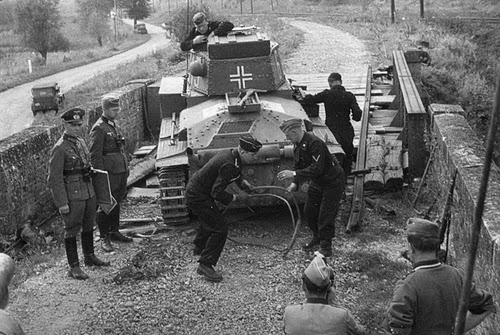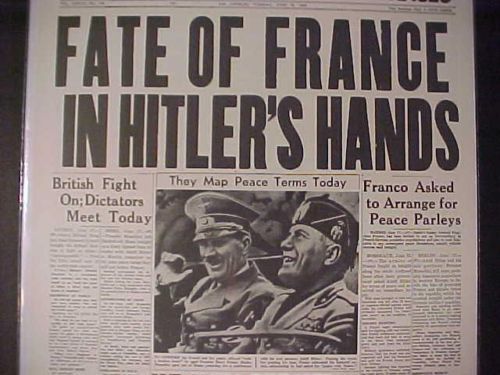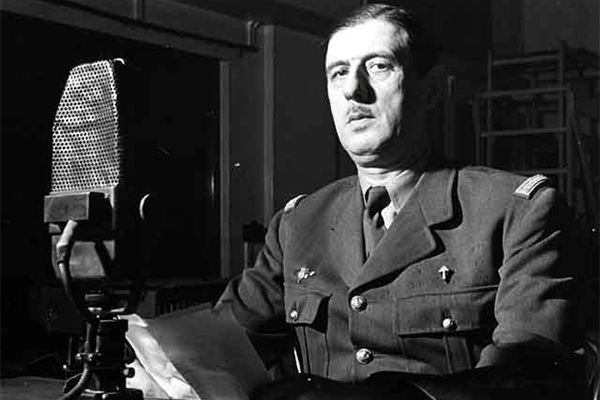Saturday 22 June 1940
The Germans and French at Compiegne sign the Armistice at 18:36 after minor revisions requested by the French. General Huntziger, who led the ineffective 2nd Army at Sedan whose collapse led to the decisive panzer thrust through to the sea, signs for France, General Keitel for Germany. General Weygand orders a cease-fire upon the signing.
A provision which the French do not contest because they believe that British defeat is just around the corner is that French POWs will remain imprisoned until there is "peace." In addition, the French must surrender any German POWs and anyone else in the country who has fled Germany. Any French from this point forward resisting the occupation are subject to summary execution.
An extremely sensitive topic is the disposition of the French fleet. Article 8 provides that it must be demobilized and disarmed - but remain under French control in French metropolitan ports. The British, watching from the outside, are not satisfied that this will keep the ships out of German hands.
It is impossible to exaggerate the impact of the French surrender has on the German martial psyche. After this, Hitler truly does acquire a virtually god-like status in the minds of many ordinary German civilians and military troops alike. This day erases a stain on the collective German memory that had been festering for 22 years, and the affair is masterfully stage-managed on short notice for maximum propaganda effect. In fact, Hitler easily could have completed the surrender on the 21st, but he stretches it out to this second day to prolong the good times.
The Armistice with Germany does not include Italy, and a separate French delegation leaves for Rome to negotiate with Mussolini. Mussolini hounds his commanders to grab as much territory in southern France as possible before the conclusion of hostilities. They only make it to the outskirts of Menon despite having over a dozen divisions against scattered French resistance. The Italians make no progress at all in the Alps.
Reduced British evacuations continue at St. Jean de Luz.
 |
| Just for comparison, this photo was taken in November 1918 in Compiegne when the Germans surrendered. |
The RAF raids Krupps factories at Essen and aircraft plants throughout Germany during the night.
Battle of the Atlantic: U-30 (Kapitänleutnant Fritz-Julius Lemp) torpedoes and sinks 3,999-ton Norwegian freighter Randsfjord in the eastern Atlantic. There are 29 survivors, and 4 perish.
U-32 (Oberleutnant zur See Hans Jenisch) torpedoes and sinks 9,026-ton Norwegian tanker Eli Knudsen 100 miles southwest of Cape Clear, Ireland. All 37 aboard survive when picked up by the sloop HMS Sandwich.
U-38 (Kapitänleutnant Heinrich Liebe) torpedoes and sinks 5,145 ton Greek freighter Neion in the Bay of Biscay.
U-65 (Kapitänleutnant Hans-Gerrit von Stockhausen) torpedoes and sinks 7,011-ton French tanker Monique in the Bay of Biscay.
Destroyer USS Dickerson (DD 157) pays a visit to Bilbao, Spain to safeguard US interests on the Continent.
Free French corvette La Bastiasie hits a mine in the North Sea and sinks.
Italian submarine Capponi sinks Swedish freighter Elgo.
German raider Pinguin sails from Norway for the Atlantic. Its ultimate destination is the Indian Ocean.
New French battleship Jean Bart arrives in Casablanca, Morocco.
Convoy OB 172 departs from Liverpool.
North Africa: The Regia Aeronautica bombs the British base at Alexandria with a dozen S.81 bombers based on Rhodes. They also send a dozen SM-79 bombers against Matruh and send 22 bombers against French positions in Bizerte, Tunisia.
US Government: Congress passes the National Defense Act, which raises the national debt limit from $45 billion to $49 billion and frees up $994 million annually for defense.
French Government: Charles de Gaulle makes another broadcast, his third. For the first time, he uses the term "Free French." De Gaulle states that "all free Frenchmen" must "continue the fight" in any way possible:
Everything which can be collected by way of French military elements and potentialities for armaments production must be organised wherever such elements exist. I, General de Gaulle, am undertaking this national task here in England. I call upon all French servicemen of the land, sea, and air forces; I call upon French engineers and skilled armaments workers who are on British soil, or have the means of getting here, to come and join me.Once again, de Gaulle uses his support from the British to establish his name in the public consciousness at a very emotional moment in the life of his country. Very few people know who de Gaulle is in France, which is probably why he always refers to himself in his speeches... repeatedly. It is a dangerous rhetorical tool that amazingly works - gloriously. De Gaulle reads the public mood perfectly and knows despairing patriots are looking for a savior, a strong man who stands for the world they knew just two months previously and, more importantly, is fighting to return it to reality. This speech is not as famous as some of his others, but de Gaulle's creation of a cult of personality is a gradual process that accumulates like a snowball rolling down the Alps where Frenchmen are still fighting successfully.
 |
| William Shirer (right) and another journalist reporting on the French surrender, Compiègne, France, 21-22 Jun 1940. (Kopf, German Federal Archive: Bild 183-L10819). |
June 1, 1940: Devastation at Dunkirk
June 2, 1940: Hitler Visits France
June 3, 1940: Operation Paula
June 4, 1940: We Shall Fight
June 5, 1940: Fall Rot
June 6, 1940: Weygand Line Crumbling
June 7, 1940: British Evacuating Narvik
June 8, 1940: Operation Juno
June 9, 1940: Norway Capitulates
June 10, 1940: Mussolini Throws Down
June 11, 1940: Paris an Open City
June 12, 1940: Rommel at St. Valery
June 13, 1940: France Goes Alone
June 14, 1940: Paris Falls
June 15, 1940: Soviets Scoop Up Lithuania
June 16, 1940: Enter Pétain
June 17, 1940: The Lancastria Sinks
June 18, 1940: A Day of Leaders
June 19, 1940: U-boats Run Wild
June 20, 1940: Pétain Wilts
June 21, 1940: Hitler's Happiest Day
June 22, 1940: France Is Done
June 23, 1940: Hitler in Paris
June 24, 1940: Six Million Jews
June 25, 1940: German Celebrations
June 26, 1940: USSR Being Belligerent
June 27, 1940: Malta in Peril
June 28, 1940: Channel Islands Bombed
June 29, 1940: Gandhi Insists on Independence
June 30, 1940: Channel Islands Occupied
2020










